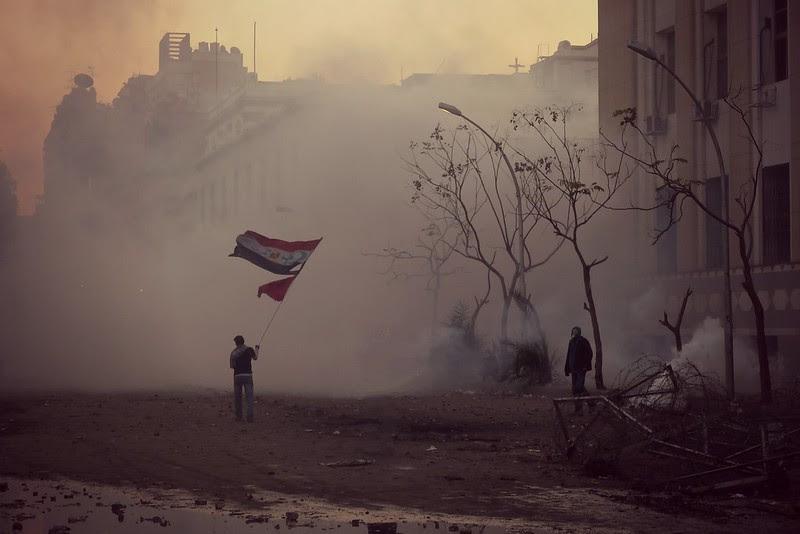Africa Insiders: In Egypt, protests return to the streets


A protester waves an Egyptian flag on 4 February 2012. Credit: Alisdare Hickson
The essentials: Seven years after the revolution and five years after the military coup that brought President Abdel Fattah El-Sisi to power, another wave of protests has erupted in Egypt and was brutally crushed by security forces. At least 2,300 people were arrested since September 20, despite protests remaining overwhelmingly peaceful.
The context: Egypt experienced a mass uprising in 2011 as part of the Arab Spring, which culminated in the military’s removal of long-time autocrat Hosni Mubarak. After a military-led interim period, the Muslim Brotherhood won a series of elections, with Mohammed Mursi winning the race for the Presidency. The Brotherhood’s to reform the constitution with an emphasis on Islamic law and teachings were met with strong opposition and protests by secular parts of the society in 2013, culminating in a second coup and the arrest of Mursi. The military again assumed power, brutally repressing any opposition. Since the second coup, at least 3,130 people have been killed in crackdowns on protests and riots, most of them supporters of the Muslim Brotherhood and pro-democracy activists.
The latest round of protests since September 20 are fed by more or less the same dynamics that inspired the 2011 revolution: poverty is rising, with GDP per capita and employment well below 2011 levels. Political repression is rampant, while a large share of the government budget is spent on the armed forces. One voice calling for protests is the businessman and activist Mohammed Ali, a former building contractor now living in exile in Spain who says that he has seen first hand how public money has been subverted to build lavish villas for Egypt’s elite, including President Sisi himself.
The good: The protests show that opposition to the regime remains alive and that the revolution of 2011 has ingrained a certainty in the population that mass protest can topple a regime.
The bad: President Sisi and his supporters in the military have also drawn their lessons from 2011 and 2013. Their swift and brutal reaction to the protests, which in themselves were unlikely to pose a significant challenge to the regime, shows that they have internalized the danger that organized civil society can pose to their grip on power. As long as the security forces remain united, retain the resources to effectively suppress the opposition and benefit from international disinterest, it is hard to imagine how peaceful protest could challenge them.
The future: A key ingredient in the failure of Egypt’s democratic experience between 2011 and 2013 has been the inability of secular and religious pro-democracy forces to reconcile their agendas. Hardly only a problem in Egypt, the security forces will retain an advantage, as long as civil society remains split. Given the poor performance of Sisi’s regime, further cycles of protests, repression and coups are quite likely, but lasting positive change will only come, once Egypt’s various political and social movements find common ground on which to challenge autocratic rule.
- World Bank statistics for
- Egypt: Largest wave of mass arrests since President Abdel Fattah al-Sisi came to power (Amnesty International)
- ‘Leave, Sisi!’: All you need to know about the protests in Egypt (Al Jazeera)
- Egypt’s Harsh Crackdown Quashes Protest Movement (New York Times)
- President Abdel Fattah el-Sisi is getting away with tyranny in Egypt thanks to his UK and US allies (Independent)
- Egypt Is Using Apps to Track and Target Its Citizens, Report Says (New York Times)
- Egypt’s Economy Is Improving, But Egyptians Can’t Tell (Bloomberg)
- Egyptian activist Alaa Abdel Fattah rearrested amid crackdown (Al Jazeera)
Discuss with @PeterDoerrie on Twitter
Pay what you want for the FULL Africa Insiders Newsletter!
We hope you enjoyed this Free Edition of the Africa Insiders, but is only a taste of the full experience. This week, the Full Edition also covered:
- What we are talking about: Cameroon’s national dialogue delivers some surprises
- Hear this word: Predator lecturers exposes
- Links of the week: Everything Africa-related that is worth your time and attention
To upgrade, email [email protected], telling us the price you’d like to pay.
Yes, you decide the price as long as it’s at least $2 per month to cover the transaction costs.
If you are unsure what to pay, we recommend $10, but it’s up to you and we won’t judge. If you give more ($15/month, $50/month, $100/month!), your extra donation above $10 will go into a special fund for AfricanArguments.org to commission in-depth articles by African writers and journalists that will be free to read for everyone.
Again, just email [email protected] and let us know any amount of $2 or more and you’ll get the Full Africa Insiders Newsletter for the price that feels right to YOU!
The Africa Insiders’ Newsletter is a collaboration between AfricanArguments.org and @PeterDoerrie, with contributions from @_andrew_green and @Shollytupe and assistance from Stella Nantongo. Part of the subscription revenue is funding in-depth and freely accessible reporting and analysis on African Arguments.




